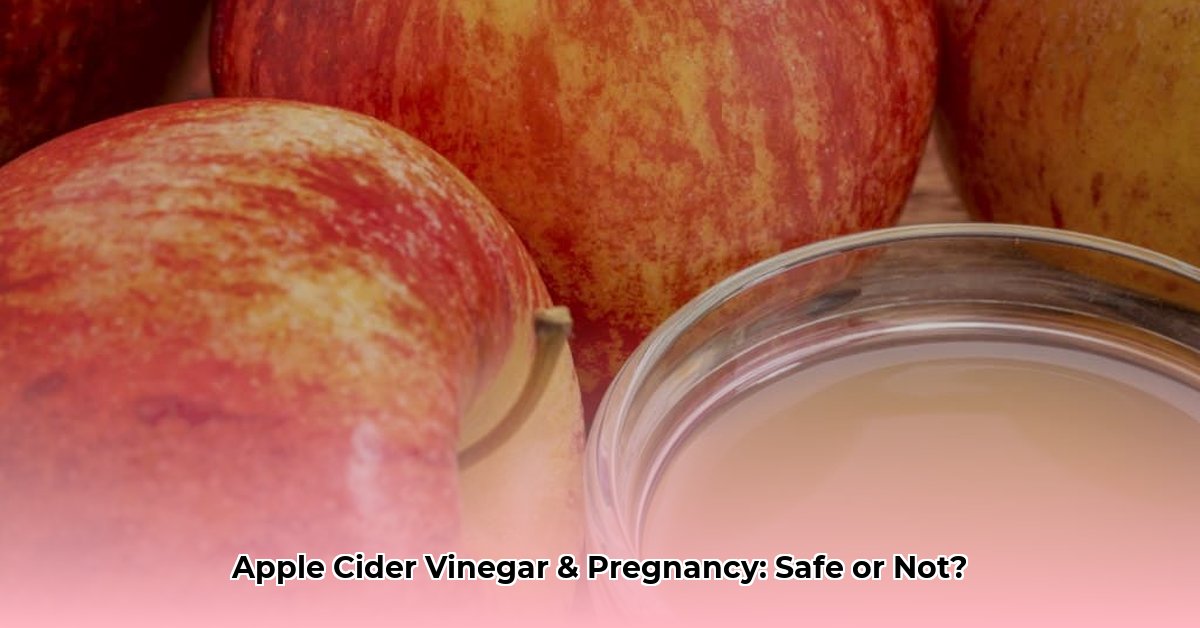Introduction: The ACV Craze and Pregnancy Precautions
Apple cider vinegar (ACV) is a popular home remedy touted for various health benefits. Its use during pregnancy, however, requires careful consideration. While many are curious about its potential to alleviate pregnancy symptoms, it’s crucial to prioritize safety and consult with your healthcare provider before incorporating ACV into your routine.
Debunking the Myths Surrounding ACV in Pregnancy
Several claims circulate about the benefits of ACV during pregnancy, but scientific evidence supporting these claims is often lacking. Let’s examine some common myths:
- Myth: ACV cures morning sickness.
-
Reality: Some anecdotal reports suggest ACV may relieve nausea, but scientific studies have not confirmed this. Ginger or peppermint tea are often recommended as safer alternatives.
-
Myth: ACV controls blood sugar, preventing gestational diabetes.
-
Reality: While limited research suggests ACV might influence blood sugar levels in non-pregnant individuals, these findings don’t necessarily apply to pregnancy. A healthy diet and regular exercise are proven strategies for managing gestational diabetes.
-
Myth: ACV helps with heartburn.
- Reality: ACV’s acidity could potentially worsen heartburn or irritate the esophagus for some individuals. Elevating your head while sleeping and avoiding trigger foods are generally recommended first-line approaches.
Safety Concerns: Pasteurization and Bacteria
A critical distinction exists between pasteurized and unpasteurized ACV. Unpasteurized ACV, often labeled “with the mother,” contains bacteria, including potentially harmful ones like Listeria. Listeria infection during pregnancy can have serious consequences. Pasteurization eliminates this risk. Therefore, unpasteurized ACV should be avoided entirely during pregnancy.
Even with pasteurized ACV, caution is advised. Its high acidity can erode tooth enamel and potentially cause esophageal irritation.
Potential Benefits (with Caveats)
Limited research suggests ACV might offer some benefits during pregnancy, but more rigorous studies are needed. Some potential areas of interest include:
- Blood sugar regulation: Preliminary studies in non-pregnant individuals hint at a possible role in blood sugar control. Further research is crucial to determine its applicability and safety during pregnancy.
- Gut health: ACV contains prebiotics, which could theoretically support gut health. However, the impact on pregnant women specifically requires further investigation.
It’s crucial to emphasize that these potential benefits are based on limited evidence and should not replace proven medical treatments.
Risks of ACV Consumption During Pregnancy
Along with the lack of robust evidence for its benefits, ACV consumption during pregnancy carries potential risks:
- Tooth enamel erosion: The high acidity of ACV can damage tooth enamel, particularly with frequent or prolonged use.
- Esophageal irritation: Some individuals experience heartburn or esophageal discomfort after consuming ACV.
- Medication interactions: ACV could potentially interact with certain medications.
How to Use ACV During Pregnancy (If Approved by Your Doctor)
If your doctor approves ACV use, follow these precautions:
- Choose pasteurized ACV: Avoid unpasteurized ACV due to the risk of harmful bacteria.
- Dilute thoroughly: Mix 1-2 tablespoons of pasteurized ACV in 8 ounces of water.
- Moderate consumption: Limit intake to a maximum of twice daily.
- Monitor for side effects: Discontinue use if you experience any discomfort.
Pregnancy-Safe Alternatives to ACV
Safe and effective alternatives for common pregnancy ailments include:
- Nausea: Ginger, peppermint, vitamin B6
- Heartburn: Elevating your upper body, small frequent meals, avoiding trigger foods
- Indigestion: Fiber-rich foods, probiotics
Frequently Asked Questions (FAQs)
- Q: Can I use ACV to treat gestational diabetes?
-
A: No, ACV should not be used as a treatment for gestational diabetes. Consult your doctor for safe and effective management strategies.
-
Q: Is ACV harmful to my baby?
- A: Unpasteurized ACV poses a risk to your baby. Even pasteurized ACV should be used with caution and only under your doctor’s supervision.
The Importance of Consulting Your Doctor
This information is for educational purposes only and does not constitute medical advice. Always consult your doctor or midwife before using ACV during pregnancy. They can assess your individual health status and provide personalized recommendations based on the latest scientific evidence. They can also help you manage your pregnancy symptoms safely and effectively.
- Best Books on Meditation Recommended by Mindfulness Experts - January 30, 2026
- Best Mindfulness Books for Anxiety, Sleep, and Daily Peace - January 29, 2026
- Books On Mindfulness For A Happier, More Present Life - January 28, 2026
















